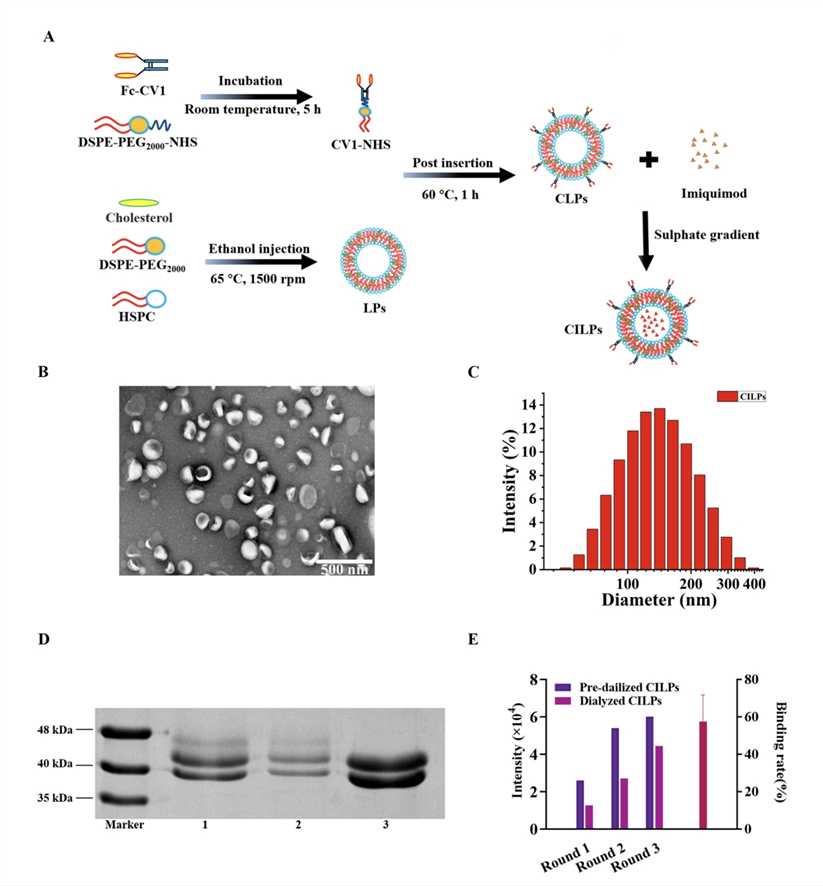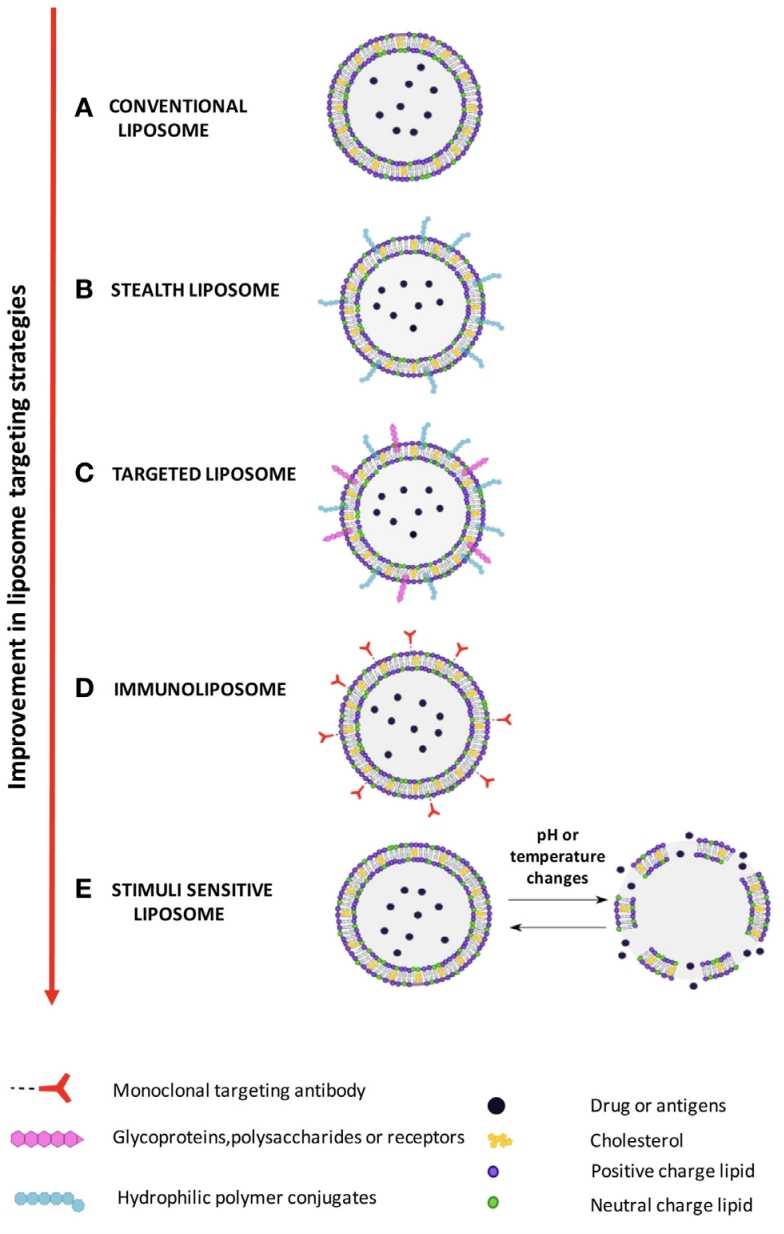Immune System Targeting Antibody-coupled Liposome Development Service
With the advancement of biotechnology and a deeper understanding of targeted therapies, the potential for antibody-coupled liposomes that target the immune system will continue to expand in clinical applications, and they are expected to play a significant role in future treatments. Creative Biolabs is continuously working on improvements and innovations to enhance their safety and efficacy.
Introduction
Antibody-coupled liposomes are a type of nano-drug delivery system that combines the properties of antibodies and liposomes to enhance drug targeting and therapeutic efficacy. Creative Biolabs has developed a variety of antibody-liposome products targeting the immune system by selecting appropriate antibodies that are aimed at specific cells or tumor markers. Our products can enter target cells through antibody-mediated endocytosis, thereby improving drug uptake. Notably, some of these products have demonstrated impressive antitumor effects in animal models.
Creative Biolabs has developed a variety of antibody-conjugated liposomes aimed at targeting the cardiovascular system. For instance, antibodies that recognize specific cardiac markers are used to modify liposomes, enabling them to selectively identify cardiac cells and effectively deliver anticancer drugs or other therapeutic agents. Our products are characterized by the dual features of enhanced biocompatibility of the liposomes and the specificity of the antibodies. Up to now, we have enabled the simultaneous loading of multiple drugs or molecules for combination therapy or synergistic immunotherapy.
 Fig.1 The Development of CD47 Targeted Liposomes.1,3
Fig.1 The Development of CD47 Targeted Liposomes.1,3
Services
Currently, Creative Biolabs develops immune system-targeted antibody liposomes for clients, focusing on drug screening and optimization to enhance their efficacy and targeting capabilities. We also conduct in vitro and in vivo pharmacokinetic studies to assess the distribution, metabolism, and excretion characteristics of antibody liposomes in animal models. Through toxicological studies, we assist our clients in evaluating the safety and potential side effects of these antibody liposomes. Moreover, we can assess the impact of antibody liposomes on the immune system, including analyses of immunogenicity and immune tolerance.
In addition, we help clients identify and validate biomarkers to evaluate the efficacy and mechanisms of action of antibody liposomes. We can also provide various animal models, such as mice and rats, for standardized preclinical trials to verify the effectiveness of targeted therapies. Meanwhile, we are also exploring the use of genetic engineering techniques to modify the Fc region of antibodies to enhance their binding with immune cells such as macrophages and B cells, thereby boosting the immune response.
In recent projects, our antibody-liposome conjugation service targeting the immune system offers unique technical features and significant clinical advantages in enhancing therapeutic targeting, reducing side effects, and improving efficacy. Our antibody-coupled liposome products enable the sustained release of drugs, prolonging their half-life within the body and enhancing efficacy. Additionally, these products can precisely target specific cells or tissues, thereby minimizing damage to normal cells.
Process
Creative Biolabs requires the selection of an appropriate target antigen, typically a specific protein associated with tumor cells or other pathological conditions. Subsequently, high-affinity screening techniques are employed to identify monoclonal antibodies against this antigen from an antibody library. Once high-specificity antibodies are obtained, our scientists proceed to the liposome construction phase. The antibodies are attached to the surface of the liposomes through chemical modification or physical adsorption, creating antibody-modified liposome complexes that enhance recognition capabilities on target cells.
Upon completing the liposome preparation, we conduct a series of characterization experiments, including measuring particle size, viscosity, drug loading capacity, and morphology, to ensure they meet the requirements for drug delivery. Additionally, in vitro, cell experiments and the establishment of animal models are critical steps for validating the targeting effects and efficacy of the complex. We further assist our clients in optimizing their formulations and processes by observing the uptake and cytotoxic response of target cells.
 Fig.2 Liposome Targeting Techniques Optimazation.2,3
Fig.2 Liposome Targeting Techniques Optimazation.2,3
Advantages
At Creative Biolabs, The technology of constructing antibody liposomes targeting the immune system demonstrates promising potential in drug delivery and therapy, particularly in cancer treatment, vaccine development, and autoimmune diseases.
- Strong Targeting: By utilizing specific antibody molecules, antibody liposomes can selectively identify and bind to particular cells or tissues, enhancing drug targeting and minimizing damage to healthy cells.
- Increased Drug Efficacy: Antibody liposomes targeting the immune system can elevate the concentration of drugs in desired areas, thereby improving the efficacy of treatments, especially in fields like tumor immunotherapy.
- Reduced Side Effects: The precise targeting capabilities of antibody liposomes can significantly limit drug distribution throughout the body, thereby lowering side effects and increasing patient tolerance.
- Controlled Release: The construction of liposomes allows for the sustained release of drugs, providing ongoing therapeutic effects while decreasing the frequency of administration, and enhancing patient compliance.
- Multifunctional Carriers: Antibody liposomes are not only suitable for transporting traditional drugs but can also serve as carriers for gene therapy or vaccine delivery, showcasing a wide range of application potential.
- Biocompatibility and Biodegradability: Liposomes are typically made from biocompatible materials, ensuring a high level of safety, and they can degrade within the body, reducing the risk of long-term toxicity.
- Enhanced Immune Response: Embedding antigens within antibody liposomes can more effectively activate the immune system, increasing the intensity and duration of the immune response.
Creative Biolabs can precisely couple antibodies with liposomes, enabling targeted delivery to specific sites. This not only significantly enhances the bioavailability of the drugs but also reduces systemic side effects and improves therapeutic efficacy. We offer customized antibody-liposome solutions to meet your specific needs. If you are interested in our antibody-coupled liposome services, please feel free to contact us anytime.
- Chang, Rui, et al. "Liposome-Based Co-Immunotherapy with TLR Agonist and CD47-SIRPα Checkpoint Blockade for Efficient Treatment of Colon Cancer." Molecules 28.7 (2023): 3147.
- Nisini, Roberto, et al. "The multirole of liposomes in therapy and prevention of infectious diseases." Frontiers in Immunology 9 (2018): 155.
- Distributed under Open Access license CC BY 4.0, without modification.
For research use only. Not intended for any clinical use.
This site is protected by reCAPTCHA and the Google Privacy Policy and Terms of Service apply.



